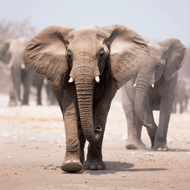
Taking a stand against illegal wildlife trade
The permanent destruction of hundreds of seized ivory tusks by the Sri Lankan Government has been applauded by the Born Free Foundation.
President Maithripala Sirisena, together with ministers, diplomats and other distinguished guests, witnessed the event to demonstrate Sri Lanka’s commitment to combatting the illegal wildlife trade.
Welcoming the bold move, Adam M. Roberts, chief executive officer of Born Free, said: “This brave decision by the Sri Lankan government is to be loudly applauded. Overwhelmingly, the world now recognises that ivory belongs on elephants, and nowhere else.
"Today, Sri Lanka joins the growing number of countries taking bold action to deny wildlife traffickers their blood money and blaze a path for a future with wild elephants.”
The ivory was seized by Sri Lanka Customs in Colombo in May 2012 from a ship en route from Kenya to Dubai. Had it not been impounded, the ivory would have been sent to Thailand.
Following a request of the Sri Lankan government, a team from the International Consortium on Combatting Wildlife Crime collected DNA samples from the seized ivory. Later forensic analysis revealed that the elephants had been poached in Southeast Tanzania and Northern Mozambique.
Manori Gunawardena, an elephant scientist who witnessed the destruction, believes that the destruction event signified a strong willingness for her country to combat illegal trade at both a national and international level.
She said: “I am relieved that it’s finally happening and am thrilled at the buy in from the president and prime minister. Sri Lanka is making a very strong statement by going ahead with the destruction with the support of the highest levels of government.”



 The Veterinary Medicines Directorate (VMD) is inviting applications from veterinary students to attend a one-week extramural studies (EMS) placement in July 2026.
The Veterinary Medicines Directorate (VMD) is inviting applications from veterinary students to attend a one-week extramural studies (EMS) placement in July 2026.